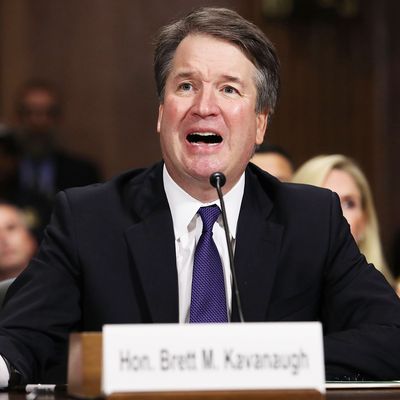
Forget about the sexual-assault charge for a moment. Suppose another Supreme Court nominee — Elena Kagan, say — had appeared before the Senate and delivered a snarling, unhinged partisan rant, like Brett Kavanaugh did on Thursday. Suppose Kagan had charged “The behavior of several of the Republican members of this committee at my hearing a few weeks ago was an embarrassment,” and then proceeded to accuse Republicans, without any evidence, of having concocted an elaborate partisan plot.
At that moment, that justice’s confirmation would at minimum face severe peril, and probably be completely dead. Bear in mind that the central theme of every judicial confirmation has been a promise in one form or another to apply the law dispassionately, to “call balls and strikes.” Candidates who had a political background, like Kagan or Kavanaugh, faced stricter scrutiny and traditionally had to make more fulsome assurances that they had put politics behind them for good.
Yet the display that ought to have been a disqualification somehow became a qualification. After his prospects suffered apparently fatal damage by Christine Blasey Ford’s highly credible charge of attempted rape, Kavanaugh’s show of raw partisan animosity thrilled his patrons. “Judge Kavanaugh showed America exactly why I nominated him,” exulted President Trump. “This was why he nominated him from the beginning,” Kellyanne Conway told Gabriel Sherman. Fox & Friends triumphantly and accurately praised Kavanaugh’s “very Trumpian” speech.
But it was not just the Trumpiest wings of the party that delighted in their prospective Trumpy justice. Kavanaugh delighted even some of the most Trump-skeptical members of the conservative movement. This column by David French, a generally anti-Trump conservative, explains how Kavanaugh rallied even #NeverTrump conservatives by activating their raw partisan resentment. “When Brett Kavanaugh spoke with great emotion not just about the sexual-assault allegations against him but also the broader character attacks made against him by Democrats, he voiced the emotion of honorable conservatives across the nation,” argues French.
His column is an anthropologically valuable document of the psychological mechanisms that hold the movement together. “It is a simple fact that time and again good conservative men and women have been subjected to horrific smears for the sin of disagreement,” he argued. “This was the moment when a member of the ‘establishment,’ the person who is supposed to sit quietly, respond mildly, and understand the pain of their opponents without voicing their own anguish, to absorb anger without showing anger, finally said ‘enough.’”
It was Kavanaugh’s very willingness to chuck aside the entire convention of judicial dispassion, and present himself as an enraged partisan standing shoulder to shoulder with every conservative who has been called something mean by a snotty college student, that convinced his party to close ranks behind him.
By deftly channeling their shared grievances against the left, Kavanaugh gave conservatives a way to overlook all the facts that had troubled them before: The curious gap in his calendar of 1982, which appeared to show a gathering that lined up with Ford’s own account. (Read Philip Bump’s excavation of this key unexplored detail.) Or the many implausible explanations Kavanaugh gave of his yearbook, which he might have truthfully explained as caddish youthful boasts, but instead explained away with his implausible choirboy cover story. It was all ignored because he was a Republican under siege from the left.
Kavanaugh’s speech was truly Trumpian, in a way that revealed how Trump tapped so deeply into the conservative soul. He dispensed with any pretense of law as a neutral value. Everything was reduced to power and motive. He invoked his own work to impeach Bill Clinton (on a sprawling investigation that began as a probe of an old land deal), and managed not to find any case for self-reflection in this episode at all. Instead he mentioned it to show that Democrats were vile liars bent on destroying their prey. And the notion that Democrats have hatched secret plots to undermine the legitimate government as revenge for the Clintons — a central theme of Trump’s rhetoric — formed the spine of Kavanaugh’s case.
Perhaps the most chilling line in Kavanaugh’s speech was, “what goes around, comes around.” He did not say it with any evident sadness, nor did he renounce it as a value. Here was a man apparently threatening revenge on his political enemies, and asking for a lifetime appointment with supreme power of judicial review with which to do it. Kavanaugh’s promise to conservatives vis-à-vis the law is Trump’s promise vis-à-vis the presidency: he will protect us against them. A vote for Kavanaugh is a vote to Trumpify the Supreme Court.






























